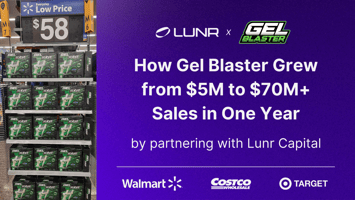The Challenge Gel Blaster launched in 2019 as a direct-to-consumer brand selling recreational Gel...
How Organic Plantcare Brand Arber Took Over Retail

Planting the Seeds for Arber
When entrepreneur Vanessa Dawson moved from New York City to LA, tending to her new garden quickly sparked business inspiration. Dawson was surprised by the lack of natural, eco-conscious garden care essentials compared to the non-toxic advances in other household categories.
In 2021, Dawson launched Arber to pioneer the space- leveraging innovative “biological” ingredients proven in agriculture to stimulate plant and soil health without toxins. After bootstrapping initial R&D, Arber’s plant food, fungicide and insecticide concentrates quickly gained traction. Arber launched its ecommerce website in early 2021, and within months, secured partners like The Sill and Grove Collaborative.
“We decided to launch in retail right out of the gate,” recalled Arber CEO Dawson to Modern Retailer. Their crisp branding and genuine garden enthusiast voice connected with millennial home & hobby gardeners.
By mid-2021, Arber’s promising formulations, captivating branding, and early digital sales attracted attention and ultimately purchase orders from big box retailers Walmart and Target. Transitioning from a DTC startup to supplying thousands of retail locations is a daunting challenge, but Dawson knew retail relationships were essential for long-term growth.
Securing Elusive Retail Funding as Emerging Brands
These initial big box orders meant Arber needed to produce and ship $1m+ worth of inventory on a tight timeline. Arber would need to come up with the cash to pay its manufacturers long before they would be paid for the goods.
THE MOST CAPITAL INTENSIVE PORTION FOR ANY SMALL BRAND IS FUNDING INVENTORY... THERE IS AT LEAST A SIX-MONTH CASH OUTLAY BEFORE YOU SEE A PAYMENT FROM THE RETAILER
Vanessa Dawson, Arber Founder & CEO
"Let’s say Walmart gives us an 8-week window from purchase order until the product needs to be in stores. In reality, we needed to be producing that inventory 6 months ago to hit the goal.”
Standard funding sources fall painfully short for brands in this situation. Venture capital and equity rounds come bundled with ownership dilution, slowed decision-making, and portfolio misalignments. Many emerging brands also lack the years of revenue history and assets traditional lenders expect.
The transition to physical retail poses major financing challenges for many direct-to-consumer brands like Arber. Vanessa elaborated on the disconnect, "When you're dealing with banks or other startup-oriented financiers, their evaluation process is much more geared toward mature businesses with years of revenue history.”
Without tailored inventory financing, Arber would need to prematurely give up equity or just to fund their first big retail production runs. There had to be a better way.

A Strategic Solution - Aligned for Growth
Arber ultimately chose to partner with Lunr Capital, an emerging CPG specialist lender that financed production costs directly. Rather than arbitrary loan terms, Lunr tailored inventory financing that aligned to Arber’s production calendars and upcoming purchase order deadlines. This bespoke, data-driven inventory financing approach bridged the exact working capital gaps Arber faced in their watershed retail rollout.
Vanessa praised their intuitiveness around early stage CPG cycles, “Lunr understands the inputs and how to match up the process of PO writing and manufacturing... For the brand, it’s not just writing orders for that one product - it’s ordering bottles, labels, packaging - for both domestic suppliers and overseas manufacturers.”
She emphasized that Lunr teams' retail experience brings a specialized understanding of CPG dynamics lacking in most brands. Combined with connections across manufacturing, distribution and more, Lunr's ecosystem helps emerging brands navigate the competitive landscape.

Retail Growth Unlocked
With aligned growth capital from Lunr Capital, 2022 and 2023 were watershed years for Arber, including distribution in Walmart, Target, and over 500 garden centers. In early 2024, Arber grew from 4 SKUs at Target to 10- marking the next growth phase for the company as consumers have more Arber products to choose from.
"LUNR CAPITAL HAS HELPED US EXPAND INTO NEW SALES CHANNELS, INCREASE OUR DOOR COUNT, AND LAUNCH ADDITIONAL SKUS. ALL OF THESE THINGS REQUIRE CAPITAL – AND LUNR HAS BEEN A BIG PART OF SOLVING THESE PROBLEMS FOR US."
Arber is resonating strongly with mainstream consumers. 2024 will be a growth year for Arber; plans include new product launches while continuing to widen retail distribution with more grocery and specialty retail partners.
For emerging CPG brands targeting brick and mortar shelf space, the barriers seem almost insurmountable. But by securing inventory financing strategically tailored to their situation, Arber proves that with the right support, startups can still think big.


